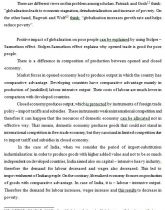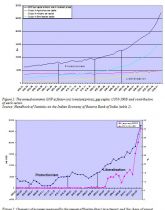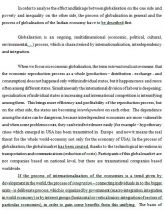Bakalárska práca: EMPIRICS OF GLOBALISATION - GLOBALISATION AND ITS IMPACT ON POVERTY AND INEQUALITY IN INDIA
Skryť detaily | Obľúbený- Kvalita:88,2 %
- Typ:Bakalárska práca
- Univerzita:Ekonomická univerzita v Bratislave
- Fakulta:Fakulta medzinárodných vzťahov
- Kategória:Ekonomika
- Podkategória:Ekonómia
- Ročník:3. ročník
- Rozsah A4:23 strán
- Zobrazené:1 395 x
- Stiahnuté:4 x
- Veľkosť:0,1 MB
- Formát a prípona:MS Office Word (.doc)
- Jazyk:anglický
- ID projektu:12671
- Posledna úprava:11.08.2020
This paper is about the impacts of globalisation on poverty and inequality in India. I decided to choose India, because during its history, it has realized two different types of economic policy: interventionist economic policy (1965-1981) and economic policy of liberalisation (1991-). The first one resulted to inward-looking protectionism, the second one to open trade policy, which has accelerated the process of globalisation of Indian economy in to the world economy. This process offers possibilities to compare impacts of these types of policies on poverty and inequality.
The first part is about characteristic features of globalisation process in general. Globalisation process in the world has been accelerated from 1980s due to trade liberalisation. Using the arguments from the Theory of Comparative Advantages and this part is trying to explain, why is open trade policy good for the economic growth in comparison with protectionism.
In the second part, I focused on relation between poverty and globalisation. To explain, that globalisation has positive affect on poverty is used the Theory of Stolper -Samuelson effect. However, some scholars criticize this theory and believe that globalisation has negative impact on poverty.
Third part is aimed on the relation between globalisation and inequality. This part is trying to explain, that although inequality measured by Gini coefficient has slightly risen in the period of globalisation, it does have to mean, than globalisation is impoverishing poor people. On the other hand, if the growth would distribute national income more equal, the reduction of poverty would be even faster. To reach more equal distribution, economic policy should be concentrated on additional reforms - education reform, labour market reform- that would help poor people to gain from the growth.
Finally, I came to conclusion that liberalisation of economy, which accelerate process of globalisation, is considered inevitable, but not sufficient condition of reduction of poverty.
...
The first part is about characteristic features of globalisation process in general. Globalisation process in the world has been accelerated from 1980s due to trade liberalisation. Using the arguments from the Theory of Comparative Advantages and this part is trying to explain, why is open trade policy good for the economic growth in comparison with protectionism.
In the second part, I focused on relation between poverty and globalisation. To explain, that globalisation has positive affect on poverty is used the Theory of Stolper -Samuelson effect. However, some scholars criticize this theory and believe that globalisation has negative impact on poverty.
Third part is aimed on the relation between globalisation and inequality. This part is trying to explain, that although inequality measured by Gini coefficient has slightly risen in the period of globalisation, it does have to mean, than globalisation is impoverishing poor people. On the other hand, if the growth would distribute national income more equal, the reduction of poverty would be even faster. To reach more equal distribution, economic policy should be concentrated on additional reforms - education reform, labour market reform- that would help poor people to gain from the growth.
Finally, I came to conclusion that liberalisation of economy, which accelerate process of globalisation, is considered inevitable, but not sufficient condition of reduction of poverty.
...



